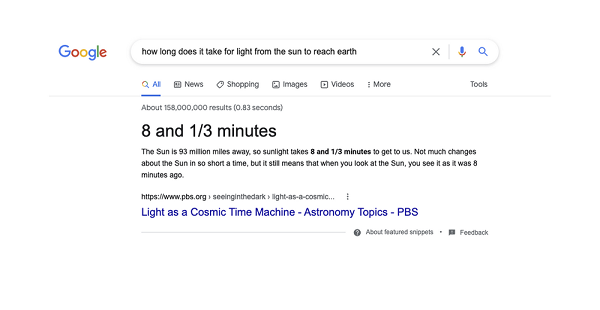SEO, Social Media
Google Outlines New Algorithm Improvements to Improve the Accuracy of its Displayed Search Results
- By Brett Belau
12 Aug

Google’s looking to add more context to its Search results, in order to mitigate the spread of misinformation, by adding improved contextual data matching for Search Snippets, and more supplementary info within Search results, in order will help users decide on which results are most accurate.
First off, Google’s improved its algorithms that fuel its Search snippets, which are the direct response results that it displays in Search queries.
As explained by Google:
“By using our latest AI model, Multitask Unified Model (MUM), our systems can now understand the notion of consensus, which is when multiple high-quality sources on the web all agree on the same fact. Our systems can check snippet callouts (the word or words called out above the featured snippet in a larger font) against other high-quality sources on the web, to see if there’s a general consensus for that callout, even if sources use different words or concepts to describe the same thing. We’ve found that this consensus-based technique has meaningfully improved the quality and helpfulness of featured snippet callouts.”
In other words, the system can now double-check stated facts and claims for use in snippets, which should help to improve the accuracy of the displayed results.
In addition, Google also says that its systems are also getting better at understanding when a featured snippet doesn’t provide relevant context.
“This is particularly helpful for questions where there is no answer: for example, a recent search for “when did snoopy assassinate Abraham Lincoln” provided a snippet highlighting an accurate date and information about Lincoln’s assassination, but this clearly isn’t the most helpful way to display this result.”
Google says that it’s reduced the appearance of featured snippets in such cases by 40%, helping to improve immediate answers, while also stopping the spread of misleading or false responses.
Though that probably doesn’t help site managers that are looking to drive traffic from Google. Snippets provide immediate answers for searchers, but they also reduce the need for users to click-through to the actual site – so while this may be an improvement for Google’s UI, it’s not great for web managers and those reliant on Search referrals (i.e. everyone) to get people to their content.
So yay for Google, boo for everyone else. Maybe keep tabs on your SEO data for any potential declines as a result (though good luck identifying this as the cause).
Google’s also looking to help provide searchers with more context around why certain results are displayed, including expanded context within its ‘About this result’ element.

As you can see in this example, the update will include the addition of info on how widely a source has been circulated, online reviews about the source or company, and information on site ownership. That could help to provide important context on the information presented, which may influence the searchers’ view on the accuracy of the listed info.
Google’s also expanding its ‘Content Advisory’ warnings on search results where its system doesn’t have high confidence in the overall quality of the results available.

Google notes that this does not indicate that no helpful information is available, or that a particular result is low-quality, it simply adds more context about the whole set of results on the page.
Information accuracy is increasingly important in the modern age, where people have become more reliant on using web sources to clarify facts. Social media platforms are often identified as a key impediment in this respect, as they provide the capacity for anyone to broadcast anything on any given topic, true or not, and that’s one contributing factor that’s led to an overall decline in trust in online media outlets.
Indeed, Google itself recently partnered with YouGov on a new survey, which found that 62% of internet users now believe that they see false or misleading information on a weekly basis.

It’s harder than ever to sort fact from fiction, which is why additions like these are important for ensuring trust in Google’s products, and keeping Search, which is a key platform for all kinds of research, as accurate and valuable as possible for all users.
No one wants to facilitate the spread of misinformation, but at the same time, no one wants to stop people from sharing their views and perspectives either. These new additions seek to strike a balance between these elements, by adding contextual matching to Google’s Search results to better align with overall consensus from trusted sources.
Source: www.socialmediatoday.com, originally published on 2022-08-11 17:06:34
Connect with B2 Web Studios
Get B2 news, tips and the latest trends on web, mobile and digital marketing
- Appleton/Green Bay (HQ): (920) 358-0305
- Las Vegas, NV (Satellite): (702) 659-7809
- Email Us: [email protected]

© Copyright 2002 – 2022 B2 Web Studios, a division of B2 Computing LLC. All rights reserved. All logos trademarks of their respective owners. Privacy Policy

![How to Successfully Use Social Media: A Small Business Guide for Beginners [Infographic]](https://b2webstudios.com/storage/2023/02/How-to-Successfully-Use-Social-Media-A-Small-Business-Guide-85x70.jpg)



![How to Successfully Use Social Media: A Small Business Guide for Beginners [Infographic]](https://b2webstudios.com/storage/2023/02/How-to-Successfully-Use-Social-Media-A-Small-Business-Guide-300x169.jpg)


Recent Comments